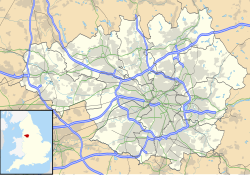History
Slade, known anciently as Milkwall Slade, was an estate comprising 24 acres (9.7 ha) in Rusholme and 20 acres (8.1 ha) in Gorton, both in Manchester, England. From about the mid-13th century until the reign of Elizabeth I, it was held by a family who adopted Slade as their surname. They sold the estate to the Siddall family, who in 1583 began construction of Slade Hall. Work was completed by 1585, as evidenced by an inscription on a beam over the porch, which also bears the initials of the builder, "E. S." for Edward Siddall. The Siddalls and their descendants occupied the house for the next 300 years. [1]
On 25 February 1952, Slade Hall was designated a Grade II* listed building. [2]
The hall was offered for sale at auction in 2002 and was bought by a property developer for £527,000. [3] By that time, the building had already been restored and divided into shared accommodation for 14 residents. [4] In the early 1990s, it served as the registered office of the Partington Housing Association. [5]
Architecture
Slade Hall is an Elizabethan timber-framed house on a stone base, built to a hall-and-cross-wing plan. [a] There are brick extensions to the rear, a slate roof, and a 19th-century wing added to the right of the original structure. It is of two storeys, the upper storey being jettied. [2]
The stud-and-rail timber frame has zig-zag herringbone bracing between the constructional timbers. A porch in the angle between the main gable and the southern wing has painted lozenges resembling quatrefoils. The main hall has two first-floor four-light wooden mullioned casements; the range to the left has a restored fourteen-light mullion and transom window, with a three-light window immediately to its right. The range of the cross-wing on the right has ten-light mullion and transom windows at the ground floor and twelve-lights at the first floor. [2]
The interior retains exposed timberwork showing the house's original construction. Plaster friezes remain visible in the first-floor chamber above the hall, described by architectural historian Norman Redhead as "crude 16th-century stuff". They depict mainly heraldic motifs, including the Elizabethan coat of arms and the Siddall family's crest, as well as an "entertaining" hunting scene.
This page is based on this
Wikipedia article Text is available under the
CC BY-SA 4.0 license; additional terms may apply.
Images, videos and audio are available under their respective licenses.







